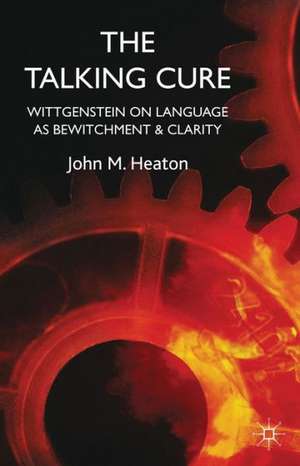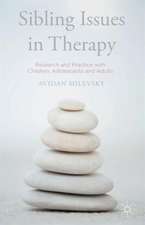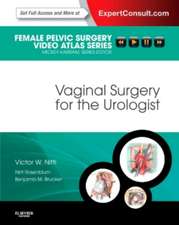The Talking Cure: Wittgenstein's Therapeutic Method for Psychotherapy
Autor J. Heatonen Limba Engleză Paperback – 7 apr 2013
| Toate formatele și edițiile | Preț | Express |
|---|---|---|
| Paperback (1) | 635.65 lei 6-8 săpt. | |
| Palgrave Macmillan UK – 7 apr 2013 | 635.65 lei 6-8 săpt. | |
| Hardback (1) | 640.06 lei 6-8 săpt. | |
| Palgrave Macmillan UK – 9 apr 2010 | 640.06 lei 6-8 săpt. |
Preț: 635.65 lei
Preț vechi: 747.82 lei
-15% Nou
Puncte Express: 953
Preț estimativ în valută:
121.63€ • 127.31$ • 101.24£
121.63€ • 127.31$ • 101.24£
Carte tipărită la comandă
Livrare economică 31 martie-14 aprilie
Preluare comenzi: 021 569.72.76
Specificații
ISBN-13: 9781137326430
ISBN-10: 1137326433
Pagini: 244
Ilustrații: XVI, 227 p.
Dimensiuni: 140 x 216 x 14 mm
Greutate: 0.29 kg
Ediția:2010
Editura: Palgrave Macmillan UK
Colecția Palgrave Macmillan
Locul publicării:London, United Kingdom
ISBN-10: 1137326433
Pagini: 244
Ilustrații: XVI, 227 p.
Dimensiuni: 140 x 216 x 14 mm
Greutate: 0.29 kg
Ediția:2010
Editura: Palgrave Macmillan UK
Colecția Palgrave Macmillan
Locul publicării:London, United Kingdom
Cuprins
Abbreviations of Wittgenstein's Work Preface The Problem Introduction Fearless Speech Talking versus Writing The Critical Method Reasons and Causes Elucidations Back to the Rough Ground The Self and Images A Non-Foundational Therapy References
Recenzii
'In this superb book John Heaton presents and defends a post Freudian 'talking cure' approach to psychotherapy. What gives the book a special weight is its reliance on the work of Wittgenstein. Scarcely a page goes by without a quotation from and insightful remarks on his writing. This appeal to Wittgenstein is remarkable in its depth of understanding and in the range of texts cited. The ideas thus culled are artfully employed in laying out the details of the theory-free take on therapy that constitutes John Heaton's talking cure. They are also most tellingly used in an ongoing attack on what are seen as the similar theory laden approaches found in the work of Freud and the cognitive therapists [...] Altogether a delightful and important book.'
- Professor J. Canfield, University of Toronto, Canada, USA
'This book shows how Wittgenstein's therapeutic method can be applied to psychotherapy. An original endeavour which may well break new ground [...] a work that psychologists, psychotherapists and psychoanalysts will want to read.'
- Dr Daniele Moyal-Sharrock, University of Hertfordshire, UK
'[...] Heaton's revolutionary book requires, needs, and deserves to be read not only by psychotherapists and psychiatrists but by every mental health professional.'
- British Journal of Psychiatry
'...a devilishly complex and sophisticated book...' - The Philadelphia Association
'...the empiricist mythologies of the talkingcure, that confuse process with entity, reify distress in some thing in the client. The grip of reification is the very difficulty from which the client seeks relief. The Talking Cure elucidates this strange irony of the profession that all therapists ought to be aware of. We should be grateful to Heaton for drawing our attention to it.' - History and Philosophy of Psychology
'Though aimed at the psychotherapist - for whom it should be an essential text - this work holds profound insights for those of any discipline concerned with how we try to make sense of ourselves and our world.'
- Existential Analysis, Journal of the Society for Existential Analysis
- Professor J. Canfield, University of Toronto, Canada, USA
'This book shows how Wittgenstein's therapeutic method can be applied to psychotherapy. An original endeavour which may well break new ground [...] a work that psychologists, psychotherapists and psychoanalysts will want to read.'
- Dr Daniele Moyal-Sharrock, University of Hertfordshire, UK
'[...] Heaton's revolutionary book requires, needs, and deserves to be read not only by psychotherapists and psychiatrists but by every mental health professional.'
- British Journal of Psychiatry
'...a devilishly complex and sophisticated book...' - The Philadelphia Association
'...the empiricist mythologies of the talkingcure, that confuse process with entity, reify distress in some thing in the client. The grip of reification is the very difficulty from which the client seeks relief. The Talking Cure elucidates this strange irony of the profession that all therapists ought to be aware of. We should be grateful to Heaton for drawing our attention to it.' - History and Philosophy of Psychology
'Though aimed at the psychotherapist - for whom it should be an essential text - this work holds profound insights for those of any discipline concerned with how we try to make sense of ourselves and our world.'
- Existential Analysis, Journal of the Society for Existential Analysis
Notă biografică
JOHN M. HEATON is in private practice in London, UK as a psychiatrist and psychotherapist. He is a regular lecturer at Regent's College, London on the Advanced Diploma in Existential Psychotherapy programme, and also teaches regularly at Roehampton University, UK. He is a founder member of the Guild of Psychotherapists and was Director of Training in the Philadelphia Association, USA for many years. He was editor of Journal for Existential Analysis for seven years and his publications include: The Eye: Phenomenology and Psychology of Function and Disorder; Wittgenstein for Beginners; Introducing Wittgenstein and Wittgenstein and Psychoanalysis.







